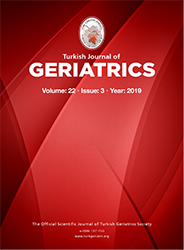2University of Health Sciences Dışkapı Yıldırım Beyazıt Training and Research Hospital, Physical Medicine and Rehabilitation, Ankara, Turkey DOI : 10.31086/tjgeri.2019.112 Introduction: Advancing age may cause deterioration of the cartilaginous and myoelastic structures of the larynx, leading to dysphagia. This study aimed to assess dysphagia and swallowing-related quality of life in elderly individuals presenting to the ENT outpatient clinic with no dysphagia complaint.
Materials and Method: Among 1829 patients who visited the ENT outpatient clinic between February 2017 and September 2018, 745(379 females, 366 males; mean age 74.27±6.32 years) volunteered to participate. These individuals had no swallowing problems or any disease that could affect swallowing, drug use, neurological disorder or history of head and neck surgery. The patients were assessed using swallowing-related quality of life scale and Eating Assessment Tool-10.
Results: According to the Eating Assessment Tool-10 scores, 550 patients(mean age 72.00±4.45 years) had normal swallowing and 195(mean age 80.68±6.44 years) had dysphagia. There was a significant difference regarding age and swallowing-related quality of life scale scores were statistically significant between the normal swallowing and dysphagia groups. Regarding diagnosis at admission, no significant intergroup differences were observed. On assessing the distribution of both scale scores according to the age groups (65?69, 70?79, 80?89, and 90?99 years), significant differences were observed among all groups. There was a significant correlation between increased scores and increasing age.
Conclusion: Dysphagia is a common problem in older individuals. However, most patients with dysphagia do not visit physicians for this problem. It should be remembered that swallowing problems are often diagnosed when patients present to outpatient clinics for other complaints.
Keywords : Dysphagia; Aged; Deglutition disorders
